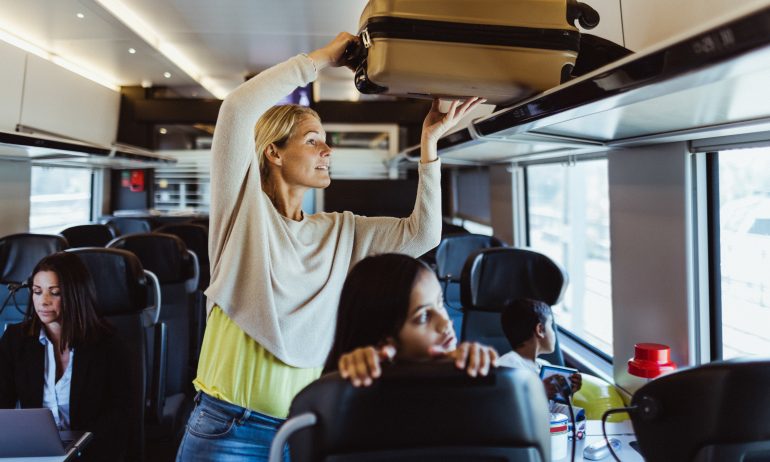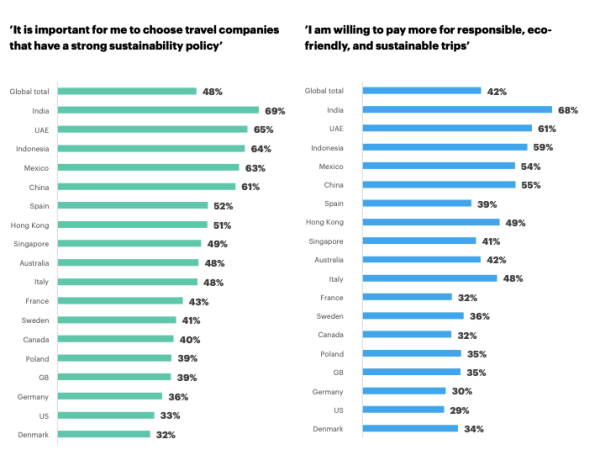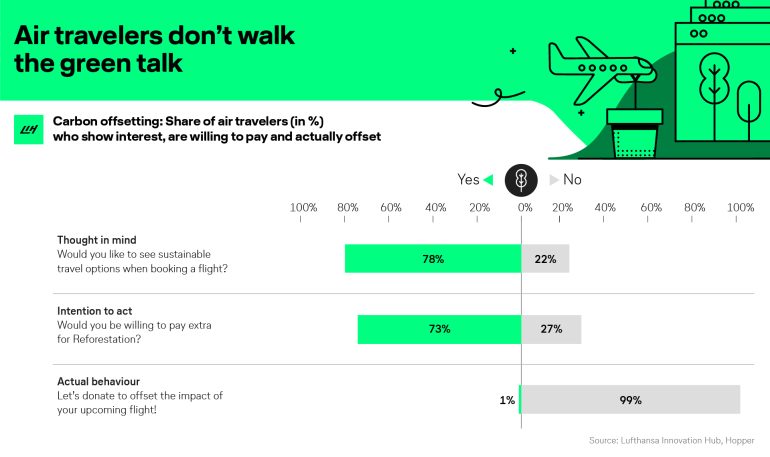Most American Travelers Don’t Book Based on Sustainability Policies

Many or all of the products featured here are from our partners who compensate us. This influences which products we write about and where and how the product appears on a page. However, this does not influence our evaluations. Our opinions are our own. Here is a list of our partners and here's how we make money.
Among the hotels, airlines, cruise ships and group trip operators that offer sustainable features — like solar panels, carbon offsets or electric vehicle charging stations — few marketing teams shy away from making them known.
At the 44-room Le Barthélemy Hotel & Spa in the French West Indies, you can partake in the boutique hotel’s zero-waste cooking classes. Linens come from ethically traced organic cotton, and all fertilizers, plants and soil on the property are organic.
Airlines such as United Airlines and Hawaiian Airlines have pledged to be 100% green by 2050 by reducing greenhouse gas emissions. Southwest offers carbon offsets and bonus Rapid Rewards points as an incentive to buy them.
The government of the Bahamas signed an agreement in March to allow the development of a $56 million residential and yacht resort community. It’ll be solar-powered, and its swimming pools will be made from recycled shipping containers. It’s the country’s first fully sustainable, zero-carbon residential and yacht resort community.
And those are just a few examples of the many travel businesses capitalizing on green initiatives in their value propositions. But do travelers actually care?
American travelers among the least likely to choose travel companies by sustainability policies
In November 2022, market research firm YouGov surveyed more than 19,000 people worldwide (including 1,503 in the U.S.) on tourism-related topics for its 2023 Global Travel & Tourism whitepaper.
YouGov asked respondents how much they agreed that it was important “to choose travel companies that have a strong sustainability policy.” While 48% of all respondents said they agreed, only 33% of U.S. respondents did — barely edging Denmark’s 32% and ranking as the second-lowest response among the 18 countries surveyed.
The survey then asked respondents the following question: "How much do you agree or disagree with the statement 'I am willing to pay more for responsible, eco-friendly, and sustainable trips?'”
Only 29% of U.S. respondents said they agree versus 42% of overall respondents — the lowest response to this question of any population in the report.

(Chart courtesy of YouGov)
The U.S. figures are certainly low. Other than Denmark, there's not a single country where a higher percentage of respondents said they agree with being willing to pay more for sustainable trips versus those who simply said choosing companies with strong sustainability policies was important.
Among the starkest disparities is in Spain, where 52% of Spanish respondents said it was important to choose sustainable travel companies — yet only 39% agreed they’d pay more for them.
Caring about the environment — until it costs more
The Lufthansa Innovation Hub, the future travel trend research arm of Lufthansa Group (which also owns the airline of the same name), sought to understand the disparity between travelers wanting more sustainable tourism options versus their willingness to actually pay more for it. It partnered with travel booking app Hopper to conduct three experiments involving about 10,000 Hopper users, the outcomes of which were published in a February 2020 report.
The first experiment randomly asked users questions such as, “Would you like to see sustainable travel options when booking a flight?” The majority of respondents, 78%, responded yes to that specific question.
The next experiment asked Hopper users if they’d be willing to pay extra to offset the impact of their travel through tree planting or flying on more fuel-efficient aircraft. For the former, a majority — 73% — said yes. However, 40% of these respondents said they would only pay a maximum of $5 more for reforestation.
And a third experiment sought to see if customers actually would pay more. It sent a notification to users who had booked a flight with Hopper within the previous 24 hours, asking for a donation to offset the impact of their flight. Only 1% of travelers ended up donating.
Note: The 36% of users who reported a willingness to opt for more fuel-efficient aircraft in the second experiment (and even pay an average of $42 more for it) couldn’t be further questioned for this final test since its not currently possible for travelers to select specific aircraft at booking.

“Travelers don’t put their money where their mouth is,” according to Lufthansa’s analysis of the experiment. “Compensation rates of 1% really surprised us because there are many survey findings of how people eagerly want to travel more sustainably.”
Easy ways to travel more sustainably (that might even save you money)
Paying more money isn’t necessarily the only way to be a green traveler. In fact, many sustainable habits are easy or free. Shut off the hotel air conditioner or heat when you leave. Don’t take food from the buffet that you won’t actually eat.
Other sustainable practices may actually save you money. For example, when renting a car, ditch the fancy muscle car in favor of a humble (and more fuel-efficient) sedan, or choose the economy seat over first class. An analysis by the World Bank Environment and Energy Team, Development Research Group estimates that first class fares can cause up to nine times more emissions than economy fares because of the space they require on aircraft.
Even a single trip where you spend more time in one place might be better than destination-hopping, where you end up taking multiple flights to myriad places (but don’t spend much time in each location). Not only will you cut the flights, but you’ll only face jetlag once. Especially if you can work remotely, spending a few weeks out of town (when typically your company wouldn’t let you take that much time off in a row) might finally be feasible.
And then there’s perhaps the most sustainable way to travel of them all — taking fewer trips that require a plane, period. If you’re taking a road trip with multiple friends or family members, driving is a more economical option anyway.
How to maximize your rewards
You want a travel credit card that prioritizes what’s important to you. Here are our picks for the best travel credit cards of 2024, including those best for:
Flexibility, point transfers and a large bonus: Chase Sapphire Preferred® Card
No annual fee: Bank of America® Travel Rewards credit card
Flat-rate travel rewards: Capital One Venture Rewards Credit Card
Bonus travel rewards and high-end perks: Chase Sapphire Reserve®
Luxury perks: The Platinum Card® from American Express
Business travelers: Ink Business Preferred® Credit Card
on Chase's website
1x-5x
Points60,000
Pointson Chase's website
1.5%-6.5%
Cashback$300
2x-5x
Miles75,000
Miles




